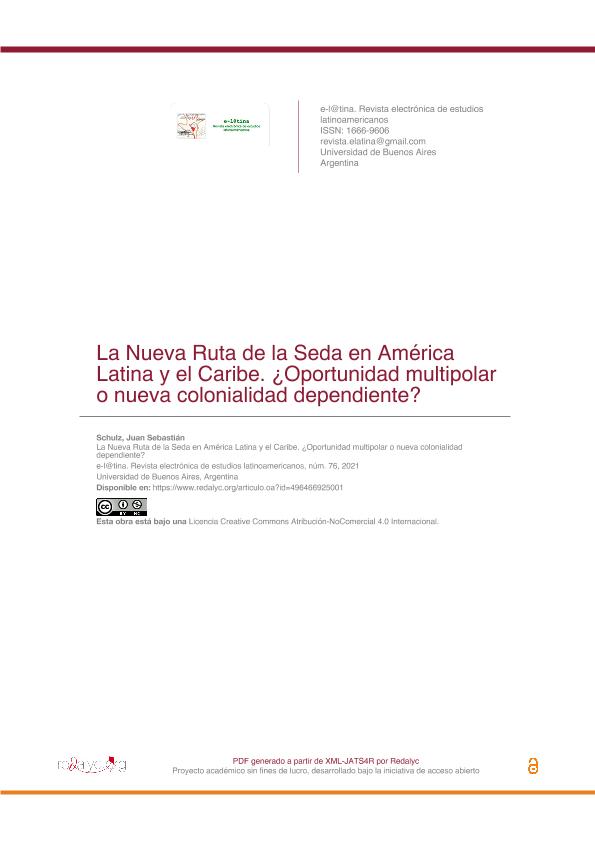Mostrar el registro sencillo del ítem
dc.contributor.author
Schulz, Juan Sebastián

dc.date.available
2023-09-18T15:52:49Z
dc.date.issued
2021-09
dc.identifier.citation
Schulz, Juan Sebastián; La Nueva Ruta de la Seda en América Latina y el Caribe: ¿Oportunidad multipolar o nueva colonialidad dependiente?; Universidad de Buenos Aires. Facultad de Ciencias Sociales. Instituto de Investigaciones Gino Germani. Unidad de Docencia e Investigaciones Sociohistóricas de América Latina; E-l@tina; 19; 76; 9-2021; 1-24
dc.identifier.issn
1666-9606
dc.identifier.uri
http://hdl.handle.net/11336/211869
dc.description.abstract
El presente trabajo se propone presentar las características principales de la iniciativa china de la Nueva Ruta de la Seda, analizando sus posibles implicancias para América Latina y el Caribe (ALC), en el marco de un proceso de transición histórico-espacial de la hegemonía mundial. El primer apartado caracteriza el estado de situación internacional partiendo de los abordajes de los teóricos del sistema-mundo, así como también desde la teoría de la dependencia y otros abordajes latinoamericanos. El segundo apartado describe las principales características de la Nueva Ruta de la Seda, puntualizando sus implicancias y principales proyectos para ALC. El tercer apartado aborda los desafíos de nuestra región en el marco de este proceso de cambio del centro de gravedad del poder mundial, y las oportunidades y amenazas que representa la incorporación de ALC a la propuesta de la Ruta de la Seda. Finalmente, en el último apartado se establecen algunas reflexiones finales, donde se enfatiza que la crisis de las potencias centrales, luego de la crisis financiera mundial y la emergencia de nuevos actores en el escenario internacional, sin dudas significan no solo un cambio en la manera que debemos mirar el mundo desde América Latina, sino una oportunidad para pensarnos soberanamente.
dc.description.abstract
This paper aims to characterize the Chinese initiative of the New Silk Road, analyzing its implications for Latin America and the Caribbean (LAC), within the framework of a process of historical-spatial transition of world hegemony. The first section characterizes the state of international situation based on the approaches of the world-system theorists, as well as from the theory of dependence and other Latin American approaches. The second section describes the main characteristics of the New Silk Road, highlighting its implications and main projects for LAC. The third section addresses the challenges of our region in the framework of this process of changing the center of gravity of world power, and the opportunities and threats posed by the incorporation of LAC into the Silk Road proposal. Finally, in the last section some final reflections are established, where it is emphasized that the crisis of the central powers, after the global financial crisis and the emergence of new actors on the international stage, undoubtedly mean not only a change in the way that we must look at the world from Latin America, but an opportunity to think sovereignly.
dc.format
application/pdf
dc.language.iso
spa
dc.publisher
Universidad de Buenos Aires. Facultad de Ciencias Sociales. Instituto de Investigaciones Gino Germani. Unidad de Docencia e Investigaciones Sociohistóricas de América Latina

dc.rights
info:eu-repo/semantics/openAccess
dc.rights.uri
https://creativecommons.org/licenses/by-nc/2.5/ar/
dc.subject
Nueva Ruta de la Seda
dc.subject
América Latina y el Caribe
dc.subject
Multipolarismo
dc.subject
Geopolítica
dc.subject.classification
Otras Geografía Económica y Social

dc.subject.classification
Geografía Económica y Social

dc.subject.classification
CIENCIAS SOCIALES

dc.title
La Nueva Ruta de la Seda en América Latina y el Caribe: ¿Oportunidad multipolar o nueva colonialidad dependiente?
dc.title
The New Silk Road in Latin America and the Caribbean: Multipolar opportunity or new dependent coloniality?
dc.type
info:eu-repo/semantics/article
dc.type
info:ar-repo/semantics/artículo
dc.type
info:eu-repo/semantics/publishedVersion
dc.date.updated
2023-09-18T13:28:08Z
dc.journal.volume
19
dc.journal.number
76
dc.journal.pagination
1-24
dc.journal.pais
Argentina

dc.journal.ciudad
Ciudad Autónoma de Buenos Aires
dc.description.fil
Fil: Schulz, Juan Sebastián. Consejo Nacional de Investigaciones Científicas y Técnicas. Centro Científico Tecnológico Conicet - La Plata. Instituto de Investigaciones en Humanidades y Ciencias Sociales. Universidad Nacional de La Plata. Facultad de Humanidades y Ciencias de la Educación. Instituto de Investigaciones en Humanidades y Ciencias Sociales; Argentina
dc.journal.title
E-l@tina

dc.relation.alternativeid
info:eu-repo/semantics/altIdentifier/url/https://publicaciones.sociales.uba.ar/index.php/elatina/article/view/6707
Archivos asociados
